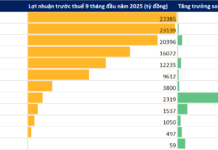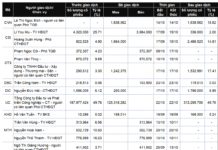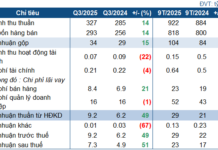The US Federal Reserve (Fed) has cut interest rates for the second time this year, a reduction of 25 basis points. Economist Dr. Nguyen Tri Hieu attributed this move to the core inflation rate falling to 2.6% and expected to reach 2% this year, alleviating the Fed’s concerns about inflation.
Despite the Fed’s rate cut, the USD Index remains relatively high, reaching 104.95 on November 8th, indicating the strength of the US dollar. This strength can be attributed to Donald Trump’s reelection as US President, which has boosted the value of the dollar against other currencies. As a result, the Vietnamese dong has weakened against the dollar, with the current exchange rate at 25,470 VND/USD.
“Trump’s victory has excited the financial markets, increasing the value of the dollar,” Dr. Hieu explained. “The Fed’s rate cut should have weakened the dollar, but Trump’s reelection has kept it strong.”
Consequently, the Fed’s rate cut has not significantly impacted the VND/USD exchange rate, failing to stimulate excitement in the Vietnamese stock market. As evident over the past two days, the Vn-Index has declined. With the high exchange rate, imported goods remain expensive, continuing to impact inflation in Vietnam,” he added.

Illustrative image. Source: Chinhphu.vn
Meanwhile, Professor Dinh Trong Thinh offered a different perspective, suggesting that the Fed’s rate cut will primarily have positive effects on the Vietnamese economy.
With Trump’s reelection, investors anticipated a stronger dollar, economic growth, and improved stock performance. However, the rate cut has led to a depreciation of the dollar, easing the pressure on the VND/USD exchange rate and making investments in Vietnam more attractive.
The low-interest rates in the US may also encourage investors to seek opportunities in emerging markets like Vietnam, which can offer higher returns.
Additionally, the rate cut provides the State Bank of Vietnam (SBV) with an opportunity to consider reducing interest rates in the floating market, thereby supporting the country’s economic development.
“However, we should also be mindful of potential negative impacts, such as a possible decrease in Vietnam’s exports due to a slowdown in the US economy, reducing the demand for Vietnamese goods,” Professor Thinh cautioned.
Nevertheless, experts believe that the Fed’s 0.25% rate cut to a range of 4.5%-4.75% will have a negligible impact on Vietnam’s economy, given the modest reduction. Additionally, the SBV has demonstrated its ability to manage exchange rates effectively, ensuring stability in the foreign exchange market.





































